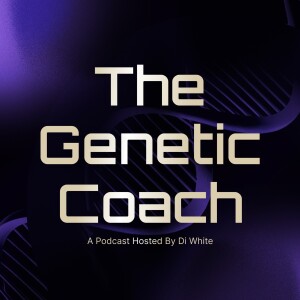
Friday Jan 17, 2025
Unlocking Personalized Fitness: How Genetic Testing Transformed an Endurance Runner’s Health and Performance with Annelie Smith RD IFNCP
In this podcast episode of The Genetic Coach, the discussion focuses on how genetic testing is transforming health, fitness, and performance. Host Di White and guest Annelie Smith, an expert in nutrigenomics and functional nutrition, explore a real-life case study of a 52-year-old ultra-endurance runner recovering from cancer treatment. They delve into the genetic insights that helped craft a personalized approach to his training, nutrition, and recovery to enhance his fitness while addressing potential health risks.
The runner’s genetic test revealed significant insights, including his low endurance, slow recovery profile, oxidative stress issues, and predisposition to high cholesterol and blood clotting. The genetic insights guided specific interventions, such as incorporating high-intensity power workouts, tailoring his nutrition to include polyphenol-rich foods, and strategically supplementing with omega-3s, CoQ10, and creatine. The episode emphasizes how genetic testing enables a more holistic and individualized approach to health and fitness, moving away from one-size-fits-all solutions.
Key Talking Points:
- Importance of Genetic Testing:
- Genetic testing serves as a roadmap for personalized health, fitness, and lifestyle strategies.
- It helps identify genetic predispositions and risk factors, such as cardiovascular issues and injury susceptibility.
- Case Study Overview:
- A 52-year-old ultra-endurance runner recovering from cancer underwent genetic testing to optimize his fitness routine and health.
- Revealed low endurance, slow recovery profile, high oxidative stress, and a predisposition to cholesterol and clotting issues.
- Actionable Genetic Insights:
- Training Adjustments:
- Focused on high-intensity power workouts to improve fitness and VO2 max, despite low endurance genetics.
- Avoided overtraining by carefully monitoring recovery and training load.
- Nutritional Changes:
- Shifted to a nutrient-rich diet emphasizing polyphenols (e.g., blueberries, broccoli sprouts) and high-quality protein.
- Strategic caffeine consumption due to slow caffeine metabolism to avoid cardiovascular strain.
- Supplementation Strategy:
- Omega-3 fatty acids for cardiovascular health and inflammation.
- Creatine to support power training and antioxidant response.
- CoQ10 for muscle recovery and addressing statin side effects.
- Holistic Health Considerations:
- The interplay between fitness, nutrition, and genetics enables a well-rounded approach to health.
- Importance of monitoring metrics like VO2 max to assess progress and risks.
- Focused on long-term health goals, including injury prevention, reduced oxidative stress, and improved cardiovascular health.
- Role of the GENEFIT App:
- Offers real-time feedback on training intensity, tissue health, and injury risk.
- Provides daily personalized nutritional and lifestyle tips to optimize performance.
- Mindset Shift:
- Emphasizes the need for strategic and deliberate training, especially as athletes age.
- Demonstrates the value of genetic testing for both elite athletes and general health seekers to refine their approach to fitness and longevity.
No comments yet. Be the first to say something!